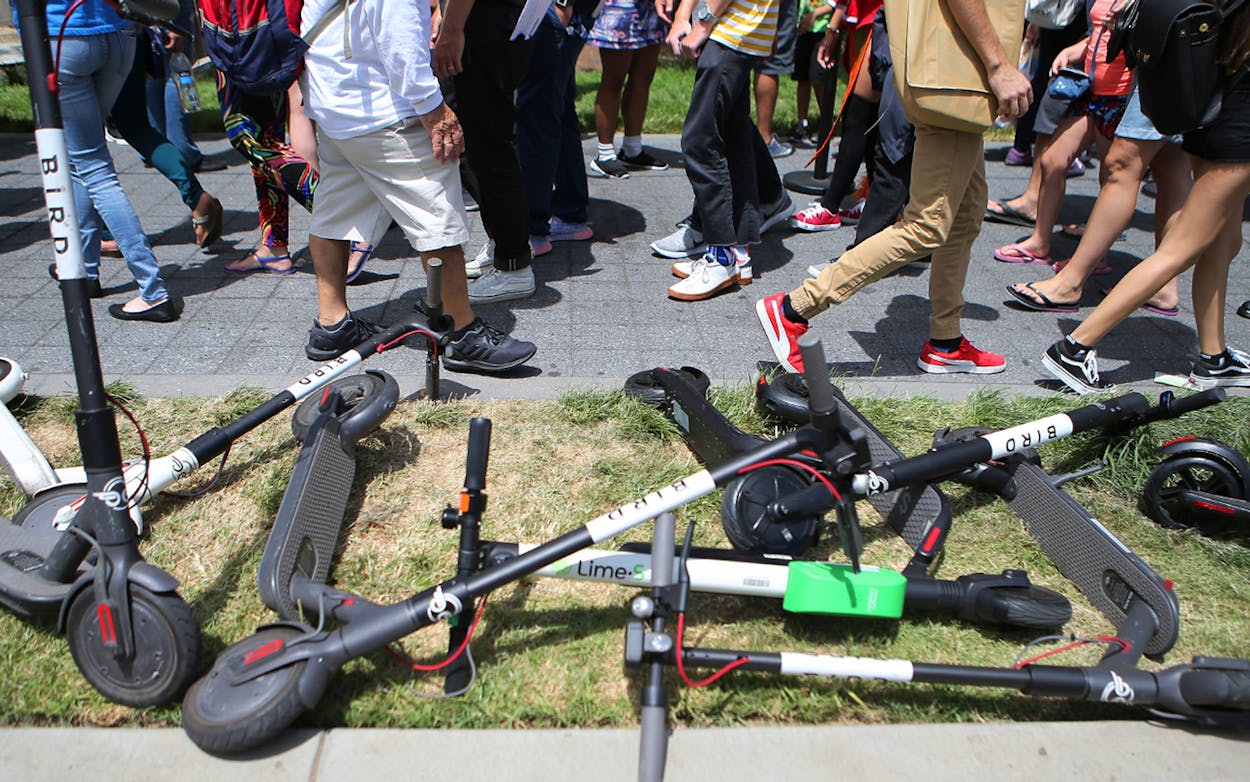Last week, Austin resident Mark Walters filed suit against Bird, one of the companies whose scooters have grown so ubiquitous in Austin that the CDC is studying their public health impact on the city. There’ve been plenty of lawsuits against the company—one Austin law firm has billboards across the city urging people to call if they’ve taken a spill while riding one of the devices—but Walters’s suit is different. He’s not a customer who suffered an injury while riding. Rather, he says, he tripped over one of the scooters while jogging and ended up with $2,400 worth of hospital bills as a result.
Walters, according to the Austin American-Statesman, is something of a professional plaintiff. He’s sued the city of Austin for an injury he sustained while jogging (a separate suit from his most recent jogging mishap), Travis County’s health care district for inadequate care as well as attorneys who represented him and prison guards who supervised him as he served a sentence in New York for “obstruction or retaliation.” But litigious habits don’t mean that Bird can ignore this case.
In a court filing, Walters claims that Bird offered him $2,000 for his injuries, a settlement offer he says he rejected because it didn’t match the amount he paid to treat his injuries. (At press time, Bird had not responded to a request for comment on any settlement offer it may have made.) If that’s true, it suggests that the company is increasingly struggling to understand the liability it possesses for how and where people leave their scooters after riding them.
That’s a challenge that Bird and other scooter companies like Lime, Lyft, and Uber are going to have to figure out how to address at some point—and quickly. The business model of the scooters is built in large part on their use of existing infrastructure—streets, sidewalks, bike lanes, etc.—which means that the companies don’t have to pay for much aside from the inexpensive devices and the maintenance of an app that customers use to rent them. But that model is a double-edged sword when it comes to where the scooters are left behind. Company policies instruct riders to park them in places that don’t obstruct sidewalks or other public right-of-ways, but there’s little repercussion for failing to do so. And, because they’re left in public, customers aren’t the only people who interact with the devices.
People have strong feelings about the scooters. Sometimes that manifests in the devices being purposefully knocked over. Sometimes the reaction is more extreme, as revealed through the environmental hazard in Austin of scooters being thrown into lakes and creeks. There’s even an Instagram account devoted to photos and videos of people destroying the scooters in dramatic ways—say, building a roaring fire and throwing scooters into it. But it’s unclear, for now, who is responsible for the public hazard scooters can cause. Does the blame lie with the person who parked it, the person who knocked it down, or the company that dropped it, along with five thousand others, onto city streets?
The answer could be some combination of the three, which is more troubling for the scooter companies than it is for anyone else. Last fall, a class-action suit filed in Los Angeles County accused Bird and the rest of the industry of “gross negligence” for its business model of plopping the scooters onto the street and letting society figure out what to do with them. (In Frisco last month, that act-now, apologize-later approach got them kicked out of the city.) The plaintiffs in that suit included several pedestrians who were struck by scooter-riding customers. While that lawsuit remains unsettled, if it finds for the plaintiffs, it seems likely that they’ll be equally liable for what they do when the scooter is dropped onto the street awaiting its next passenger.
If Bird did indeed offer Walters $2,000 to go away, in other words, it might have been a move taken in order to avoid setting a legal precedent that makes them liable for medical bills—or pain and suffering, or emotional distress—of every Joe on the street who bangs their knee because of an errant sidewalk scooter. And even if they didn’t, Walters’s suit—or another like it—could well end up establishing such a precedent.
The scooters were, and are, a good idea in theory. We need more diverse approaches to urban mobility, and there may even be a way to implement them in practice that’s safe, sustainable, and civically minded. But right now it’s the Wild West. Professional plaintiff or not, Mark Walters is right to identify the courts as a plausible venue for resolving scooter-related issues—and that resolution could end up making the entire scooter business model untenable pretty quickly.








